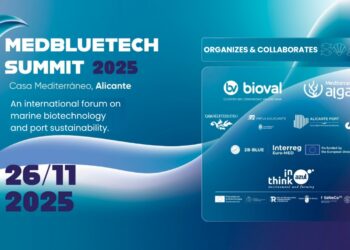From port to counter: the Fécamp seafood short value chain model
During the summer of 2025, I had the pleasure of visiting Fécamp, and as someone deeply passionate about fish markets, I found myself immersed in a remarkable world where the sea truly meets the community. Walking along the port, the scent of salt and smoke led me to Le Marché aux Poissons, a place that perfectly captures the essence of short supply chains and local value creation.
Here, the fish caught by local boats and aquaculture farms are sold directly to the public, within a few meters of the landing point. This approach not only supports fishers but also allows consumers to connect directly with the source of their food. It’s an inspiring model that, in my view, deserves to be shared and adapted across the Mediterranean and Africa, where similar coastal communities could benefit from closer ties between producers and consumers.
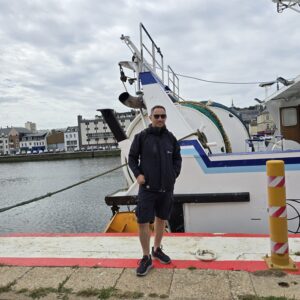
My visit continued as I admired the vibrant displays of fish, shellfish, and crustaceans laid out on ice. The lively chatter between customers and sellers, the gleam of the fresh catch, and the pride with which each product was presented revealed a deep cultural bond between people and the sea. Later, I had the opportunity to taste the products in a culinary experience that transformed curiosity into admiration.
Anchoring direct sales in the European vision
The example of Le Marché aux Poissons shows how the principles of direct sales promoted by the European Union can thrive when tradition and innovation meet. Located just steps from the fishing vessels, the market embodies transparency, traceability, and short supply chains within all fundamental elements of EU fisheries policy.
Through direct interaction with consumers, the Lecanu family has reduced intermediaries and increased the value captured by producers. This aligns with the Common Market Organisation (CMO) framework, which encourages fair competition, local development, and access to markets for small-scale operators.
In Fécamp, these principles are not theoretical; they are visible and tangible. Fresh fish, aquaculture products, and processed seafood come together in one space that welcomes both locals and visitors, turning a market into a meeting place between tradition, economy, and community.
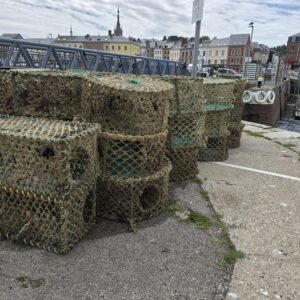
From the Port to the Consumer’s Counter
At the heart of Fécamp’s harbor, Le Marché aux Poissons stands as a direct bridge between sea and consumer. Fresh fish, salted and smoked products, and shellfish are presented in a setting that feels both traditional and modern.
The market’s “Instant Iodé” tastings add a sensory layer to the experience. My visit continued there, enjoying the aroma of grilled seafood and the gentle sea breeze while locals and tourists alike gathered to taste oysters, crabs, and shrimp, all served within sight of the boats that brought them in that very morning.
This interaction between commerce and experience transforms Le Marché aux Poissons into more than just a shop — it’s a living laboratory of the short supply chain, where freshness, transparency, and culture intertwine.
One of the key strengths of the Fécamp model is its capacity to create added value beyond the raw catch. Locally smoked and salted fish, shellfish, and ready-to-eat specialties not only diversify the market offer but also strengthen the business’s resilience. Each product, clearly labeled and proudly rooted in local tradition, tells a story of origin and craftsmanship that deeply connects with today’s consumers.
Processed products also create a recognizable identity: “Smoked in Fécamp” is more than a label; it’s a promise of quality and locality. Through this, the market ensures stability throughout the year, even when weather or catch variability affects fishing. It’s a concrete application of the EU’s call for innovation and value addition in the fisheries and aquaculture sector.
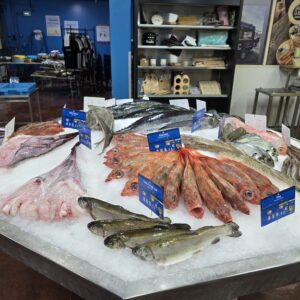
Bringing the sea to the streets
Imagining Fécamp’s experience expanding beyond the port, the concept of a mobile seafood restaurant comes naturally. Such a unit could travel through the region, offering the same fresh products and recipes at festivals or along coastal roads. This would not only promote local seafood but also strengthen the emotional connection between producers and the public.
A food truck or mobile stall could serve as a moving showcase for Fécamp’s quality and culture; allowing more people to taste, learn, and ultimately visit the market itself. During my visit, I could easily picture this next step, one that would transform Le Marché aux Poissons into an even broader ambassador of short supply chains and sustainable seafood.
Benefits, challenges, and the European framework
This integrated model of direct sales, processing, and gastronomy demonstrates the benefits of vertical integration: increased profitability, stronger identity, and transparent traceability. It enables producers to control quality and price, while offering consumers direct access to local products they can trust.
However, the path is not without challenges. Maintaining cold chain logistics, complying with food safety and retail regulations, and managing seasonal variations all require organization and investment. The European Maritime, Fisheries and Aquaculture Fund (EMFAF) provides essential support for these initiatives, funding innovation and sustainability. Yet, success ultimately depends on entrepreneurial vision, valorizing the ability to balance tradition with modern marketing, to build a narrative around the product, and to engage directly with consumers both at the counter and online.
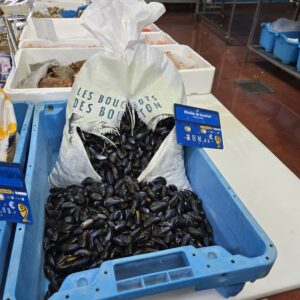
From Fécamp to the Mediterranean and Africa
The experience of Le Marché aux Poissons offers a valuable lesson for other coastal regions. Its success lies not only in its products but in its spirit — a genuine connection between the sea, the producer, and the consumer. This same model could be adapted to Mediterranean and African contexts, where fishing communities face similar challenges of market access and value retention.
Imagine small harbors in Tunisia, Morocco, Kenya, or Sicily adopting a Fécamp-inspired approach, turning their landing sites into spaces of transparency, gastronomy, and education. The principle is universal: by shortening the distance between producer and consumer, we strengthen both local economies and cultural heritage.
In the end, my visit to Fécamp was more than a discovery: it was an inspiration. It reminded me that innovation often begins with simplicity: a fresh fish, a trusted handshake, and a story worth sharing.



